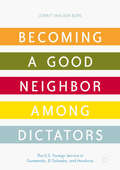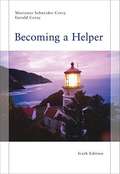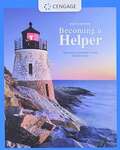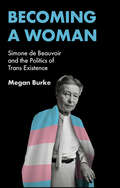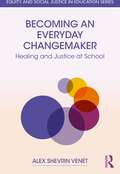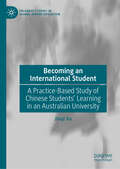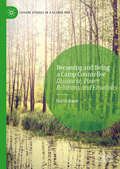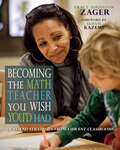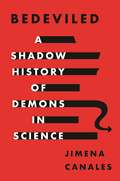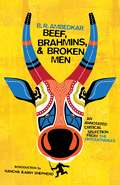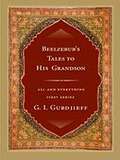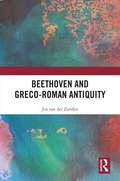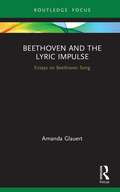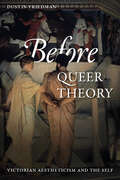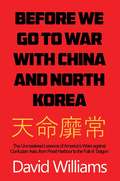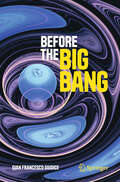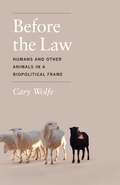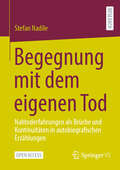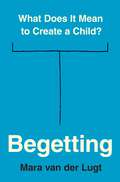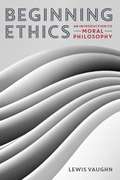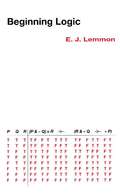- Table View
- List View
Becoming a Good Neighbor among Dictators: The U.S. Foreign Service in Guatemala, El Salvador, and Honduras
by Jorrit van den BerkVery few works of history, if any, delve into the daily interactions of U. S. Foreign Service members in Latin America during the era of Roosevelt's Good Neighbor Policy. But as Jorrit van den Berk argues, the encounters between these rank-and-file diplomats and local officials reveal the complexities, procedures, intrigues, and shifting alliances that characterized the precarious balance of U. S. foreign relations with right-wing dictatorial regimes. Using accounts from twenty-two ministers and ambassadors, Becoming a Good Neighbor among Dictators is a careful, sophisticated account of how the U. S. Foreign Service implemented ever-changing State Department directives from the 1930s through the Second World War and early Cold War, and in so doing, transformed the U. S. -Central American relationship. How did Foreign Service officers translate broad policy guidelines into local realities? Could the U. S. fight dictatorships in Europe while simultaneously collaborating with dictators in Guatemala, El Salvador, and Honduras? What role did diplomats play in the standoff between democratic and authoritarian forces? In investigating these questions, Van den Berk draws new conclusions about the political culture of the Foreign Service, its position between Washington policymakers and local actors, and the consequences of foreign intervention.
Becoming a Helper (6th edition)
by Gerald Corey Marianne Schneider CoreyWritten by a therapist and a psychology professor, this supplementary text for those embarking on a career in the helping professions focuses on the struggles faced by practitioners and the effects of the demands placed on them. Sample topics include understanding your family of origin; dealing with difficult clients; and managing boundary issues. Self-assessments and inventories found in each chapter encourage students to examine their own motives and aptitudes for becoming helpers. The fifth edition contains new information on ethics, diversity, and social activism.
Becoming a Helper (Mindtap Course List Series)
by Gerald Corey Marianne Schneider CoreyConsidering a career in the helping professions? Corey and Corey's BECOMING A HELPER, Eighth Edition, is a must read! Drawing from years of experience in the classroom and in real-world practice, the authors focus on the struggles, anxieties and uncertainties students often encounter on the road to becoming effective helpers. The book provides an overview of the stages of the helping process as it equips you with the skills and knowledge you need to become a successful helping professional. Emphasizing self-reflection, the authors give you a candid insider's look at the demands, strains and challenges of the field -- helping you determine if a helping professions career is the right choice for you. In addition, MindTap empowers you with anywhere, anytime digital learning solutions to help you maximize your course success.
Becoming a Woman: Simone de Beauvoir and the Politics of Trans Existence
by Megan BurkeThis highly engaging analysis of the contemporary, global social and political landscape of trans antagonisms draws specific attention to ""gender-critical” mobilizations of Simone de Beauvoir's account of becoming a woman in The Second Sex to advance and justify trans exclusionary positions. Through a careful examination and application of Beauvoir's philosophical and political commitments, Becoming a Woman compellingly explores the significance of her notion of becoming as not only affirmative of trans women, but also as an ethical demand to affirm trans possibilities. More than a reply to gender-critical readings of Beauvoir, this book develops an original, Beauvoirian ethics of gender affirmation offering that show why we ought to challenge trans exclusion and anti-trans movements.
Becoming an Everyday Changemaker: Healing and Justice At School (Equity and Social Justice in Education Series)
by Alex Shevrin VenetEducators with a vision for more equitable, caring schools often struggle with where to begin. I’m just one teacher, where can I start to make change? Is it even possible? How do I do this within current constraints? In this new book, bestselling author Alex Shevrin Venet empowers everyday changemakers by showing how equity-centered trauma-informed practices can guide our approach to school change. Unlike other books on social justice, this powerful resource doesn’t tell you which changes to implement; instead, it focuses on helping you develop the skills, strategies, and tools for making change meaningful and effective.Topics include change opportunities and why trauma makes change harder; skills for navigating the change journey such as building relationships, working from strengths, and navigating many streams of information; and sustainable structures for lasting change. Throughout, there are reflection questions to use as conversation-starters with fellow changemakers, as well as Rest Stops so you can pause and process what you are thinking about and learning. This book will help you start your change journey now, putting you and your students on the path to equity, justice, and healing.
Becoming an International Student: A Practice-Based Study of Chinese Students' Learning in an Australian University (Palgrave Studies in Global Higher Education)
by Jinqi XuThis book provides a unique perspective on internationalization in higher education, focusing on the experiences of Chinese business students in Australia. It challenges conventional views by investigating the nuances of Chinese students’ learning, rather than just addressing learning style differences and language barriers. The author’s personal experience as a Chinese international student, and an academic in China turned academic in Australia lends authenticity to the exploration of teaching and engaging with this demographic. The book employs a practice-based study, drawing on the metaphor of ‘becoming’ to examine the everyday practices of five Chinese business undergraduate students. The innovative use of a practice-based theoretical framework influenced by the Chinese philosophical concept of yinyang sets this book apart. This approach illuminates the intricate connections between study practices and socio-cultural influences, offering a holistic understanding of learning. The book uncovers the transformative nature of student learning through interpretative methods such as semi-structured interviews, informal interviews, reflective group discussions, participative observation, and artefacts , highlighting the fluidity and complexity across diverse contexts. This book is a valuable resource for educators and policymakers, offering insights into the ongoing process of becoming that characterizes Chinese students’ learning.
Becoming and Being a Camp Counsellor: Discourse, Power Relations and Emotions (Leisure Studies in a Global Era)
by Mandi BakerThis book explores the complexities of the recreational summer camp experience and its reliance on the expertise and emotion work of young people. Drawing on post-structural theory, Baker illustrates the discourses, power relations and emotional demands that shape camp counsellor employment experiences and well-being. Through analysis of everyday experiences and interactions, Baker unpicks the power nexus between counsellors, campers, peers and camp management, offering a deeper understanding of camp counsellor employment and the challenges for camp employees and employers. As such, this book raises a call for camp researchers and industry leaders to engage in rethinking how camp counsellor roles are understood, shaped and embodied, and how they might be ethically supported through reflexive management practices. Becoming and Being a Camp Counsellor will be of interest to scholars and students across the fields of leisure, outdoor recreation, youth studies, and sociology.
Becoming the Math Teacher You Wish You'd Had: Ideas and Strategies from Vibrant Classrooms
by Tracy Johnston ZagerAsk mathematicians to describe mathematics and they' ll use words like playful, beautiful, and creative. Pose the same question to students and many will use words like boring, useless, and even humiliating. Becoming the Math Teacher You Wish You' d Had, author Tracy Zager helps teachers close this gap by making math class more like mathematics. Zager has spent years working with highly skilled math teachers in a diverse range of settings and grades and has compiled those' ideas from these vibrant classrooms into' this game-changing book. Inside you' ll find: ' How to Teach Student-Centered Mathematics:' Zager outlines a problem-solving approach to mathematics for elementary and middle school educators looking for new ways to inspire student learning Big Ideas, Practical Application:' This math book contains dozens of practical and accessible teaching techniques that focus on fundamental math concepts, including strategies that simulate connection of big ideas; rich tasks that encourage students to wonder, generalize, hypothesize, and persevere; and routines to teach students how to collaborate Key Topics for Elementary and Middle School Teachers:' Becoming the Math Teacher You Wish You' d Had' offers fresh perspectives on common challenges, from formative assessment to classroom management for elementary and middle school teachers No matter what level of math class you teach, Zager will coach you along chapter by chapter. All teachers can move towards increasingly authentic and delightful mathematics teaching and learning. This important book helps develop instructional techniques that will make the math classes we teach so much better than the math classes we took.
Bedeviled: A Shadow History of Demons in Science
by Jimena CanalesHow scientists through the ages have conducted thought experiments using imaginary entities—demons—to test the laws of nature and push the frontiers of what is possible Science may be known for banishing the demons of superstition from the modern world. Yet just as the demon-haunted world was being exorcized by the enlightening power of reason, a new kind of demon mischievously materialized in the scientific imagination itself. Scientists began to employ hypothetical beings to perform certain roles in thought experiments—experiments that can only be done in the imagination—and these impish assistants helped scientists achieve major breakthroughs that pushed forward the frontiers of science and technology.Spanning four centuries of discovery—from René Descartes, whose demon could hijack sensorial reality, to James Clerk Maxwell, whose molecular-sized demon deftly broke the second law of thermodynamics, to Darwin, Einstein, Feynman, and beyond—Jimena Canales tells a shadow history of science and the demons that bedevil it. She reveals how the greatest scientific thinkers used demons to explore problems, test the limits of what is possible, and better understand nature. Their imaginary familiars helped unlock the secrets of entropy, heredity, relativity, quantum mechanics, and other scientific wonders—and continue to inspire breakthroughs in the realms of computer science, artificial intelligence, and economics today.The world may no longer be haunted as it once was, but the demons of the scientific imagination are alive and well, continuing to play a vital role in scientists' efforts to explore the unknown and make the impossible real.
Beef, Brahmins, and Broken Men: An Annotated Critical Selection from The Untouchables
by B. R. AmbedkarOne of twentieth-century India’s great polymaths, statesmen, and militant philosophers of equality, B. R. Ambedkar spent his life battling Untouchability and instigating the end of the caste system. In his 1948 book The Untouchables, he sought to trace the origin of the Dalit caste. Beef, Brahmins, and Broken Men is an annotated selection from this work, just as relevant now, when the oppression of and discrimination against Dalits remains pervasive.Ambedkar offers a deductive, and at times a speculative, history to propose a genealogy of Untouchability. He contends that modern-day Dalits are descendants of those Buddhists who were fenced out of caste society and rendered Untouchable by a resurgent Brahminism since the fourth century BCE. The Brahmins, whose Vedic cult originally involved the sacrifice of cows, adapted Buddhist ahimsa and vegetarianism to stigmatize outcaste Buddhists who were consumers of beef. The outcastes were soon relegated to the lowliest of occupations and prohibited from participation in civic life. To unearth this lost history, Ambedkar undertakes a forensic examination of a wide range of Brahminic literature. Heavily annotated with an emphasis on putting Ambedkar and recent scholarship into conversation, Beef, Brahmins, and Broken Men assumes urgency as India witnesses unprecedented violence against Dalits and Muslims in the name of cow protection.
Beelzebub's Tales to His Grandson: An Objectively Impartial Criticism of the Life of Man
by G. I. GurdjieffWith Beelzebub's Tales to His Grandson, G. I. Gurdjieff intended to "destroy, mercilessly . . . the beliefs and views about everything existing in the world." This novel beautifully brings to life the visions of humanity for which Gurdjieff has become esteemed. Beelzebub, a man of worldly (and other-worldly) wisdom, shares with his grandson the anecdotes, personal philosophies, and lessons learned from his own life.The reader is given a detailed discussion of all matters physical, natural, and spiritual, from the creation of the cosmos to man's teleological purpose in the universe. This edition of Beelzebub's Tales to His Grandson--the first single-volume paperback to appear in English--restores the original, authoritative translation.
Beethoven and Greco-Roman Antiquity
by Jos van ZandenLudwig van Beethoven had a life beyond music. He considered it his duty to spend leisure-time improving his Bildung (sophistication). To this end he familiarised himself with tangible manifestations of Greco-Roman antiquity, for he perceived these cultures and their representatives as examples of intellectual, moral, and artistic perfection. He consumed such writers as Homer, Plutarch, Horace, Tacitus, Euripides, and Greek poets. These texts were morally uplifting for him, and advantageous for building character. They now hold a key to Beethoven’s ideal of a steadfast, austere, and Stoic outlook, necessary for a ‘great man’ to carry out his duties. Jos van der Zanden demonstrates that Beethoven’s engagement with Greco-Roman culture was deep and ongoing, and that it ventured beyond the non-committal. Drawing on a comprehensive investigation of primary sources (letters, conversation books, diaries, recollections of contemporaries) he examines what Beethoven knew of such topics like history, art, politics, and philosophy of antiquity. The book presents new information on the composer’s republicanism, his familiarity with the works of Plato, his admiration of the elderly Brutus, his plan to utilize ‘unresolved dissonances’ in an unknown piece of music, and his decision to subscribe to a book about ancient Greek poetry. A hitherto unknown vocal piece based on lines by Euripides is revealed. The study concludes with a comprehensive survey of all compositions and sketches by Beethoven based on Greco-Roman subjects.
Beethoven and the Lyric Impulse: Essays on Beethoven Song (Routledge Voice Studies)
by Amanda GlauertAmanda Glauert revisits Beethoven’s songs and studies his profound engagement with the aesthetics of the poets he was setting, particularly those of Herder and Goethe. The book offers readers a rich exploration of the poetical and philosophical context in which Beethoven found himself when composing songs. It also offers detailed commentaries on possible responses to specific songs, responses designed to open up new ways for performing, hearing and appreciating this provocative song repertoire. This study will be of great interest to researchers of Beethoven; German song; aesthetics of words and music.
Before Anarchy
by Theodore ChristovHow did the 'Hobbesian state of nature' and the 'discourse of anarchy' - separated by three centuries - come to be seen as virtually synonymous? Before Anarchy offers a novel account of Hobbes's interpersonal and international state of nature and rejects two dominant views. In one, international relations is a warlike Hobbesian anarchy, and in the other, state sovereignty eradicates the state of nature. In combining the contextualist method in the history of political thought and the historiographical method in international relations theory, Before Anarchy traces Hobbes's analogy between natural men and sovereign states and its reception by Pufendorf, Rousseau and Vattel in showing their intellectual convergence with Hobbes. Far from defending a 'realist' international theory, the leading political thinkers of early modernity were precursors of the most enlightened liberal theory of international society today. By demolishing twentieth-century anachronisms, Before Anarchy bridges the divide between political theory, international relations and intellectual history.
Before Queer Theory: Victorian Aestheticism and the Self
by Dustin FriedmanA reimagining of how the aesthetic movement of the Victorian era ushered in modern queer theory.Late Victorian aesthetes were dedicated to the belief that an artwork's value derived solely from its beauty, rather than any moral or utilitarian purpose. Works by these queer artists have rarely been taken seriously as contributions to the theories of sexuality or aesthetics. But in Before Queer Theory, Dustin Friedman argues that aestheticism deploys its "art for art's sake" rhetoric to establish a nascent sense of sexual identity and community.Friedman makes the case for a claim rarely articulated in either Victorian or modern culture: that intellectually, creatively, and ethically, being queer can be an advantage not in spite but because of social hostility toward nonnormative desires. Showing how aesthetes—among them Walter Pater, Oscar Wilde, Vernon Lee, and Michael Field—harnessed the force that Georg Wilhelm Friedrich Hegel called "the negative," Friedman reveals how becoming self-aware of one's sexuality through art can be both liberating and affirming of humanity's capacity for subjective autonomy.Challenging one of the central precepts of modern queer theory—the notion that the heroic subject of Enlightenment thought is merely an effect of discourse and power—Friedman develops a new framework for understanding the relationship between desire and self-determination. He also articulates an innovative, queer notion of subjective autonomy that encourages reflecting critically on one's historical moment and envisioning new modes of seeing, thinking, and living that expand the boundaries of social and intellectual structures. Before Queer Theory is an audacious reimagining that will appeal to scholars with interests in Victorian studies, queer theory, gender and sexuality studies, and art history.
Before Sunrise, Before Sunset, Before Midnight: A Philosophical Exploration (Philosophers on Film)
by Hans Maes Katrien SchaubroeckRichard Linklater’s celebrated Before trilogy chronicles the love of Jesse (Ethan Hawke) and Céline (Julie Delpy) who first meet up in Before Sunrise, later reconnect in Before Sunset and finally experience a fall-out in Before Midnight. Not only do these films present storylines and dilemmas that invite philosophical discussion, but philosophical discussion itself is at the very heart of the trilogy. This book, containing specially commissioned chapters by a roster of international contributors, explores the many philosophical themes that feature so vividly in the interactions between Céline and Jesse, including: the nature of love, romanticism and marriage the passage and experience of time the meaning of life the art of conversation the narrative self gender death Including an interview with Julie Delpy in which she discusses her involvement in the films and the importance of studying philosophy, Before Sunrise. Before Sunset. Before Midnight: A Philosophical Exploration is essential reading for anyone interested in philosophy, aesthetics, gender studies, and film studies.
Before We Go to War with China and North Korea: The Unmastered Lessons of America's Wars Against Confucian Asia, from Pearl Harbor to the Fall of Saigon
by David WilliamsA war with China and North Korea is not inevitable, but neither is an American victory should such a war come. To prepare Americans for all eventualities, we might want to learn more about how East Asians think and fight. In such matters of grave seriousness, our past may become our prologue. We have engaged in five wars with Confucian Asia since Pearl Harbor. As we have had one victory, one stalemate and three defeats, it may be time to master the lessons of these struggles before we go to war with China and North Korea.
Before the Big Bang (Copernicus Books)
by Gian Francesco GiudiceA theoretical physicist returns by train from a conference, his eyes fixed on a paper on quantum cosmology. Suddenly, a little girl's voice interrupts his musings. "What are you reading?" "It's the story of the universe." "If it tells the whole story of the universe, does it say anything about me?" Starting from this question, this book explores our current understanding of the Big Bang, the primordial event that gave rise to the special mixture of space, time, and matter that we call the universe. It is a journey through cosmic history, pushing the limits of human knowledge, winding its way through general relativity, curved spaces, quantum mechanics and the multiverse. Giudice succeeds in uniting science and the history of thought, tracing the debate that animated the physics community, when faced with the hypothesis and then the confirmation of the Big Bang. This book recounts the great discoveries in cosmology and leads us to the frontiers of current scientific research. It is a fascinating and thought-provoking parable that addresses complex concepts with the fluidity of storytelling and allows us to better understand the universe around us. “A fascinating, enchanting narrative. A fairy tale that tells a true story spanning 13.8 billion years. Exciting from the first to the last page.” Fabiola Gianotti, CERN Director General “In this beautiful book, of exemplary clarity, Giudice guides us by the hand through the history and mysteries of the Big Bang.” Giorgio Parisi, 2021 Nobel Prize in Physics
Before the Law: Humans and Other Animals in a Biopolitical Frame
by Cary WolfeAnimal studies and biopolitics are two of the most dynamic areas of interdisciplinary scholarship, but until now, they have had little to say to each other. Bringing these two emergent areas of thought into direct conversation in Before the Law, Cary Wolfe fosters a new discussion about the status of nonhuman animals and the shared plight of humans and animals under biopolitics. Wolfe argues that the human-animal distinction must be supplemented with the central distinction of biopolitics: the difference between those animals that are members of a community and those that are deemed killable but not murderable. From this understanding, we can begin to make sense of the fact that this distinction prevails within both the human and animal domains and address such difficult issues as why we afford some animals unprecedented levels of care and recognition while subjecting others to unparalleled forms of brutality and exploitation. Engaging with many major figures in biopolitical thought—from Heidegger, Arendt, and Foucault to Agamben, Esposito, and Derrida—Wolfe explores how biopolitics can help us understand both the ethical and political dimensions of the current questions surrounding the rights of animals.
Before the Law: Humans and other Animals in a Biopolitical Frame
by Cary WolfeAnimal studies and biopolitics are two of the most dynamic areas of interdisciplinary scholarship, but until now, they have had little to say to each other. Bringing these two emergent areas of thought into direct conversation in Before the Law, Cary Wolfe fosters a new discussion about the status of nonhuman animals and the shared plight of humans and animals under biopolitics. Wolfe argues that the human-animal distinction must be supplemented with the central distinction of biopolitics: the difference between those animals that are members of a community and those that are deemed killable but not murderable. From this understanding, we can begin to make sense of the fact that this distinction prevails within both the human and animal domains and address such difficult issues as why we afford some animals unprecedented levels of care and recognition while subjecting others to unparalleled forms of brutality and exploitation. Engaging with many major figures in biopolitical thought--from Heidegger, Arendt, and Foucault to Agamben, Esposito, and Derrida--Wolfe explores how biopolitics can help us understand both the ethical and political dimensions of the current questions surrounding the rights of animals.
Before the Law: The Complete Text of Préjugés (Univocal)
by Jacques DerridaThinking judgment in relation to the work of Jean-François Lyotard &“How to judge—Jean-François Lyotard?&” It is from this initial question that one of France&’s most heralded philosophers of the twentieth century begins his essay on the origin of the law, of judgment, and the work of his colleague Jean-François Lyotard. If Jacques Derrida begins with the term préjugés, it is in part because of its impossibility to be rendered properly in other languages and also contain all its meanings: to pre-judge, to judge before judging, to hold prejudices, to know &“how to judge,&” and more still, to be already prejudged oneself. Striving to contain that which comes before the law, that is in front of the law and also prior to it, how to judge Jean-François Lyotard then becomes perhaps a beneficial attempt for Derrida to explore humanity&’s rapport with judgment, origins, and naming. For how does one come to judge the author of the Differend? How does one abstain from judgment to accept the term préjugés as suspending judgment and at once as taking into account the impossibility of speaking before the law, prior to naming or judging? If this task indeed seems insurmountable, it is the site where Lyotard&’s work itself is played out. Hence this sincere and intriguing essay presented by Jacques Derrida, published here for the first time in English.
Begegnung mit dem eigenen Tod: Nahtoderfahrungen als Brüche und Kontinuitäten in autobiografischen Erzählungen
by Stefan NadileIn diesem Open-Access-Buch wird die Nahtoderfahrung (NTE) als Phänomen im Kontext der Erforschung des Todes, daraus abgeleitete Todesdefinitionen und ihr Wandel vor dem Hintergrund historischer Entwicklungen und ihren gesellschaftlichen Trends beleuchtet. Mit dem Bekanntwerden des Phänomens können in Bezug auf die Aussagekraft von NTE verschiedene Deutungen identifiziert werden, die sich zum Teil mit dem Aufkommen neureligiöser Bewegungen institutionalisieren. Darauf folgt eine Hinwendung zu individuellen Innensichten auf die NTE und ihrer Kommunizierbarkeit. Die kommunikative Erörterung solcher Ereignisse gilt als Gegenstand der Darstellung eines außergewöhnlichen Ereignisses in der autobiografischen Erzählung. Die Argumentationslinie einerseits und die Topologie der Deutungsebenen andererseits bilden die Grundlage für die Analyse der Studienergebnisse. Als Datengrundlage dienen eigens für diese Arbeit erhobene biografisch-narrative Interviews. Deren Analyse resultiert in einer Typisierung, wie NTE im autobiografischen Kontext gedeutet werden, welche sozialen Deutungsmuster dabei implizit zum Tragen kommen und wie die Person von ihrer Biografie erzählt. Jeder Typus steht je für eine Grundhaltung zur Lebenswelt und je für eine Strategie zur Integration der Erfahrung in das eigene Leben.
Begetting: What Does It Mean to Create a Child?
by Mara van der LugtAn investigation of what it means to have children—morally, philosophically and emotionally&“Do you want to have children?&” is a question we routinely ask each other. But what does it mean to create a child? Is this decision always justified? Does anyone really have the moral right to create another person? In Begetting, Mara van der Lugt attempts to fill in the moral background of procreation. Drawing on both philosophy and popular culture, van der Lugt does not provide a definitive answer on the morality of having a child; instead, she helps us find the right questions to ask.Most of the time, when we talk about whether to have children, what we are really talking about is whether we want to have children. Van der Lugt shows why this is not enough. To consider having children, she argues, is to interrogate our own responsibility and commitments, morally and philosophically and also personally. What does it mean to bring a new creature into the world, to decide to perform an act of creation? What does it mean to make the decision that life is worth living on behalf of a person who cannot be consulted? These questions are part of a conversation we should have started long ago. Van der Lugt does not ignore the problematic aspects of procreation—ethical, environmental and otherwise. But she also acknowledges the depth and complexity of the intensely human desire to have a child of our own blood and our own making.
Beginning Ethics: An Introduction to Moral Philosophy
by Lewis VaughnBeginning Ethics provides students with the theoretical and logical tools they need to navigate the ethical quandaries in their daily lives. Clear writing, practical pedagogy, an emphasis on critical thinking, and an affordable price make Beginning Ethics the perfect introduction to one of the most important courses in the college curriculum.
Beginning Logic
by E. J. Lemmon..."The aim of the book is to provide the student with a good working knowledge of the prepositional and predicate calculi--the foundations upon which modern symbolic logic is built. Accordingly, emphasis is placed on the actual technique of proof-discovery."
